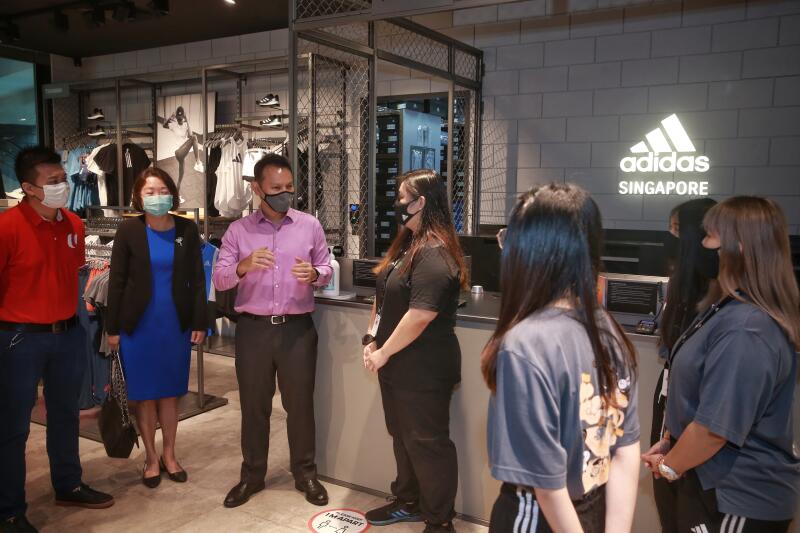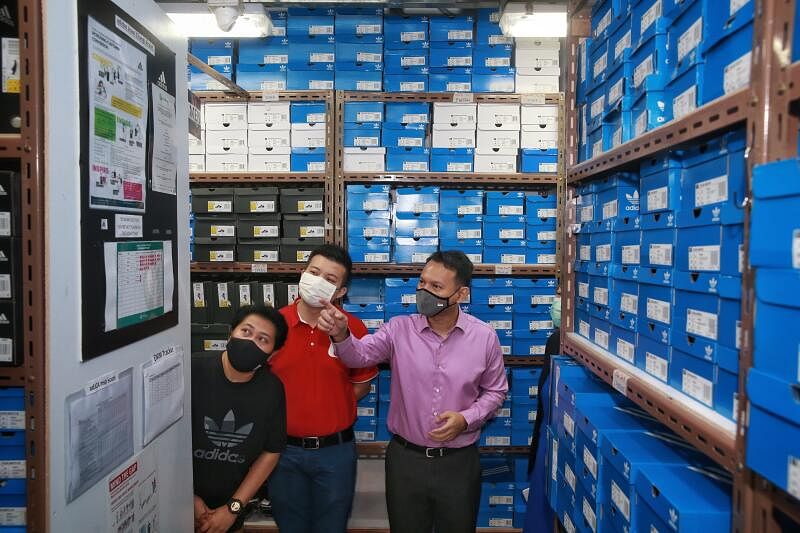Progressive wage model for retail sector under study
Sign up now: Get ST's newsletters delivered to your inbox

Mr Zaqy Mohamad speaking with shop manager Gan Shiying during a tour of the Adidas store at Jewel Changi Airport on Feb 23, 2021.
ST PHOTO: KEVIN LIM
SINGAPORE - Low-wage workers in retail may see their earnings rise if a study to implement the progressive wage model (PWM) in the sector bears fruit.
Salespeople and cashiers in supermarkets, convenience stores and fashion outlets can benefit from the move to extend the PWM to the retail sector, Senior Minister of State for Manpower Zaqy Mohamad said on Tuesday (Feb 23).
It could have a major impact on a sector that employs a large number of workers, many of whom earn low wages.
Mr Zaqy said that the Tripartite Workgroup on Lower-Wage Workers, which he chairs, hoped to provide an update on the study soon.
First introduced in 2012, the PWM sets out minimum salaries for local workers in various roles along a career and skills progression framework. Wages rise in tandem with productivity.
The PWM is currently mandatory in the cleaning, landscaping and security sectors, covering about 80,000 workers. It will be mandatory for the lift and escalator maintenance sector next year.
Mr Zaqy, who visited the Adidas store at Jewel Changi Airport, did not say how many workers in the retail sector would benefit, if the PWM was implemented.
The National Trades Union Congress, which has been pushing for a PWM in the food services and retail sectors, has estimated that 70,000 workers may gain if these two sectors implemented the wage model.
About 45 per cent of resident full-time employees in the retail sector receive salaries that are at or below the bottom 20th wage percentile of the local workforce, said Mr Zaqy.
Last year, the 20th percentile income of resident full-time employees was $2,340, including Central Provident Fund contributions.
In his Budget speech on Feb 16, Deputy Prime Minister Heng Swee Keat said that the Government's aspiration is for every sector of the economy to have some form of progressive wages.
Mr Zaqy yesterday noted that the retail sector, which is among those employing the highest numbers of lower-wage workers, is a diverse one, with businesses ranging from sporting goods stores to supermarkets to fashion outlets.

Mr Zaqy Mohamad and NTUC Central Committee member Lim Wen Sheng (in red), speaking with senior district operations manager Norhayati Bte Mohd Ali during a tour of the Adidas store.
ST PHOTO: KEVIN LIM
Businesses that are tourist-driven are harder hit by the pandemic while those in the heartland are doing better.
"Some, like supermarkets, were doing very well in the early part of the pandemic. So we have to look at different sub-sectors and look at the varied recovery (processes)," he said.
He added that the workgroup would have to study how to include e-commerce players in their discussions, and how to regulate the retail sector which is unlicensed.
The Singapore Retailers Association supports the uplifting of low- wage workers, said its executive director Rose Tong. She added: "However, timing for its implementation is a concern in that full business recovery is not expected in the next two to three years."
The move will result in rising business costs which retailers will be hard pressed to absorb, she said.
Since it was formed last October, the tripartite group has been studying various sectors that could potentially implement progressive wage models and aims to provide an interim update by the middle of this year.


